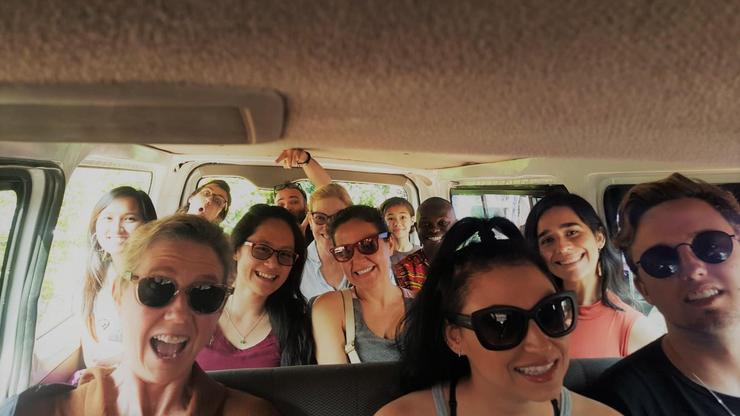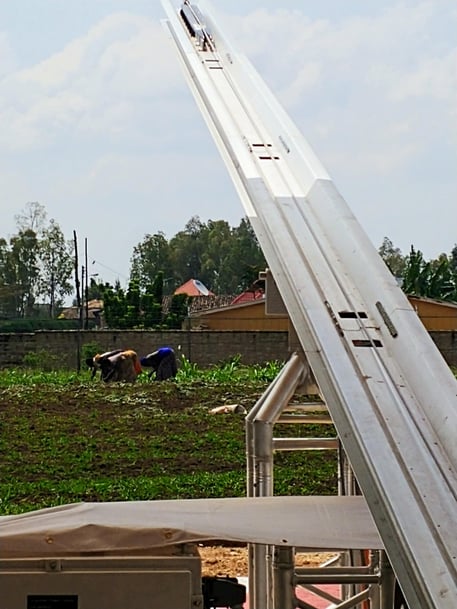Back Pocket Lessons From Exploring Rwanda

Kroc School Students in Rwanda
begin quoteDare to explore the unfamiliar and you just might discover that a place like Rwanda, as foreign to you as it may seem, has more teachable moments than you can fit into your cozy back pocket
The following post was written by Master of Arts in Social Innovation student, Laurie Bane.
Imagine traveling to a foreign destination alone, where you know nobody and suddenly finding yourself immersed in a world of intriguing sights, sounds and tastes that awaken your senses and expand your mind. This amazing opportunity is indeed possible for students wishing to examine post-conflict peacebuilding and development in what is affectionately known as “the land of a thousand hills,” the small but mighty, east African, land-locked country of Rwanda.

A launching runway for Zipline, a company in Rwanda focused on delivering blood via drone.
Throughout this particular study abroad program, which was technically a practicum for my Master's of Arts in Social Innovation (MASI) degree, I could not help but discover the significantly and equally as relevant context of post-conflict recovery and peacebuilding when examining the day-to-day life that surrounded me. Herein, lies the first lesson that I plan to carry forward into the balance of my studies. Although I tend to see the world through the lens of my background in technology, infrastructure, logistics and business, the Rwanda experience provided me with insight into how the history and politics of a region can continue to influence future development and how solutions to social challenges ultimately play out. Examining the effects of the 1994 genocide upon the country and the significant role the existing government plays in bringing about transformation has raised my awareness about considering these variables when thinking critically about social issues in the future, and I am grateful to have had this opportunity.
Another key takeaway from the trip was the deeply moving opportunity to engage with individuals that were directly affected by the genocide and hearing first-hand testimonial accounts of survival and reconciliation. They shared stories of how they persevered through the many challenges they faced, their achievements to date, and approaches to socio-economic recovery. Hearing these stories and witnessing the work they are doing now for their country and seeing how educational opportunities at the University of San Diego have played a small role in some of it was truly inspiring and humbling.
Still another interesting lesson that I found quite surprising was the fact that women’s empowerment is stressed through Rwanda’s government policies. As a matter of fact, women make up the majority of the Parliament (64%) as well as half of the country’s workforce. Following the genocide, President Kagame realized that it made practical sense to support and leverage the large population of women in order to expedite economic recovery for the country.
Aside from country-specific learnings, the experience of traveling, sharing meals, accommodations, ideas and sometimes emergency toiletries with others who are not necessarily like you can deliver the greatest teaching moments of all. The situation has the potential to remind us of just how interdependent we are upon one another, garnering unexpected mutual respect that we may not otherwise have, if not forced into spending time together. I often find that by challenging my “comfort zone” the most, taking the seat next to someone different, initiating a conversation with a local of another background or by choosing to take the less direct path to a destination, I enhance my perspective of the world, and in turn of myself and my role on the planet. So, dare to explore the unfamiliar and you just might discover that a place like Rwanda, as foreign to you as it may seem, has more teachable moments than you can fit into your cozy back pocket, and it just may be time for some new jeans anyway.
Contact:
Kevin Dobyns
kdobyns@sandiego.edu
(619) 260-7618

About the Author
The Joan B. Kroc School of Peace Studies (Kroc School) at the University of San Diego is the global hub for peacebuilding and social innovation. Founded in 2007, the Kroc School equips the next generation of innovative changemakers to shape more peaceful and just societies. We offer master's degrees in peace and justice, social innovation, humanitarian action, conflict management and resolution, and a dual degree in peace and law — programs that have attracted diverse and dynamic students from more than 50 countries. In addition to our graduate programs, the Kroc School is home to the Kroc Institute for Peace and Justice (Kroc IPJ). Founded in 2001, the Institute supports positive change beyond the classroom. Through groundbreaking research, experiential learning, and forward-thinking programs, the Kroc School and Kroc IPJ are shaping a future in which peaceful co-existence is the new normal.





